As in previous years, this year’s Plant Conservation Network awards span the full breadth of activity
required to protect New Zealand’s native plants. The 2018 award winners are:
- Individual Involved in Plant Conservation: Val Clemens
- School Plant Conservation Project: Woodlands Park School
- Plant Nursery Involved in Plant Conservation: Forest Flora Nursery
- Community Group: Te Kākano Aotearoa Trust
- Local Authority Protecting Native Plant Life: Hamilton City Council recognising Gerard Kelly
- Judges Special Award—Community: Arrowtown Choppers
- Judges Special Award—School: Motuora School
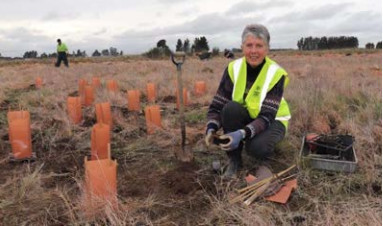 Val Clemens, Individual Award WinnerVal Clemens has been a persistent and inspirational advocate for native plants in the Ashburton District, an area of New Zealand that has seen huge losses of native biodiversity. She works tirelessly to advocate for retaining natural landscapes and planting native trees on farms, preserving local forms of native plants, if not in their original sites, then in safe places, and uses her creativity to paint a vision to inspire and galvanise conservation action. She is a long-term member of Forest and Bird, a founding member of the Ashburton Community Conservation Trust, and an inaugural member of the Council’s Ashburton District
Val Clemens, Individual Award WinnerVal Clemens has been a persistent and inspirational advocate for native plants in the Ashburton District, an area of New Zealand that has seen huge losses of native biodiversity. She works tirelessly to advocate for retaining natural landscapes and planting native trees on farms, preserving local forms of native plants, if not in their original sites, then in safe places, and uses her creativity to paint a vision to inspire and galvanise conservation action. She is a long-term member of Forest and Bird, a founding member of the Ashburton Community Conservation Trust, and an inaugural member of the Council’s Ashburton District
Biodiversity Working Group. With the help of a Honda Tree Fund grant, Val set up a potting shed, propagation house, shade house and glasshouse in her backyard and grew eco-sourced plants to
restore the Harris Scientific Reserve Kanuka Sanctuary near Ashburton. Over the 10 years she has run the nursery, she and other volunteers have grown on many threatened species including attempts to propagate the Wakanui woolly head, now classified as a Nationally Critical threatened species.
Val has also been a brave advocate for eco-sourcing as a precaution to retain the potential geneticdifferences of local forms. Val grew plants from Paddle Hill, Hakatere Conservation Park, to preemptively provide a supply of eco-sourced plants for school plantings and community plantings byForest and Bird and the Lake Clearwater Bach Holders Association. She was involved in a Project Crimson outreach. She propagated cuttings from southern rata from Mt Somers rock outcrops. Some 2000 plants were given away to foothills landowners to raise awareness of the high natural values in the foothills forest. Each plant came with a hand-crafted card from Val. Val is also a keen painter and uses her talents as an advocacy tool to raise interest in the natural environment. She has been instrumental in getting support from local communities and Wakanui School to restore the local Whakanui Beach Reserve. Although Val has now retired from running the nursery, she still collects seed to be gown on by the local council. Val has had a remarkable impact on the conservation of the unique biodiversity of the Canterbury Plains. Without her vision, botanical knowledge and persistence the Plains would be a poorer place.
School Involved in Plant Conservation: Woodlands Park School, Auckland
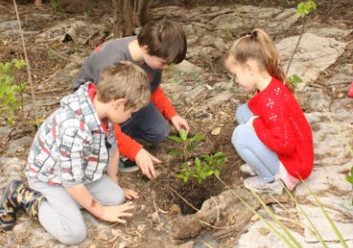 Woodlands Park School kaitiaki in their restoration projectWoodlands Park School is a small school with a big heart for the environment and sustainability. Twelve years ago, the school decided to tackle an area of weed infested land that was part of the school property.Today the school members are the proud kaitiaki of a healthy remnant of native bushwith the Waituna Stream running through it. Over the years, the school children havenot only worked hard to remove invasive weeds, including bamboo and ginger,but have also engaged with neighbouring communities and environmental groupsto grow and plant native trees. In the process, the school has created an outdoorclassroom for the school children, a valued resource for the wider communityand a haven for local wildlife. The visionof restoring a badly neglected bit of native bush back to its natural state haslargely been achieved and sustained with the ongoing conservation work.The school has a proven commitment to sustainability. The children collect seedson the school property, propagate theplants in their nursery and every year run a school planting day. As part of their roleas kaitiaki of Kopai Gully, they share their practices with others. They have hosted other schools in sustainability hui and environmental action events, and continue to raise awareness of their own restoration project and the roles that the widercommunity can play.
Woodlands Park School kaitiaki in their restoration projectWoodlands Park School is a small school with a big heart for the environment and sustainability. Twelve years ago, the school decided to tackle an area of weed infested land that was part of the school property.Today the school members are the proud kaitiaki of a healthy remnant of native bushwith the Waituna Stream running through it. Over the years, the school children havenot only worked hard to remove invasive weeds, including bamboo and ginger,but have also engaged with neighbouring communities and environmental groupsto grow and plant native trees. In the process, the school has created an outdoorclassroom for the school children, a valued resource for the wider communityand a haven for local wildlife. The visionof restoring a badly neglected bit of native bush back to its natural state haslargely been achieved and sustained with the ongoing conservation work.The school has a proven commitment to sustainability. The children collect seedson the school property, propagate theplants in their nursery and every year run a school planting day. As part of their roleas kaitiaki of Kopai Gully, they share their practices with others. They have hosted other schools in sustainability hui and environmental action events, and continue to raise awareness of their own restoration project and the roles that the widercommunity can play.
Plant Nursery Involved in Plant Conservation: Forest Flora Nursery
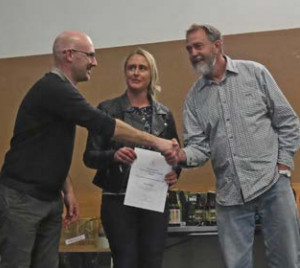 Wayne Bennett and his daughter Julia receiving their award from NZPCN President Rewi ElliotForest Flora is the go-to nursery for eco-sourced seed for the Waikato region. Wayne Bennett and his daughter Julia have been advocating for ecosourcing and the importance of using plants from representative habitats for habitat restoration for many years. Forest Flora nursery also provides species that other nurseries would not consider— species that are important niche plants to allow restoration plantings to more closely resemble natural plant assemblages. Not only do Wayne and Julia run a quality, cost-effective nursery, Wayne also is a trainer/teacher in all aspects of ecological restoration, working with schools to teach restoration planting and championing ecosourced Waikato.
Wayne Bennett and his daughter Julia receiving their award from NZPCN President Rewi ElliotForest Flora is the go-to nursery for eco-sourced seed for the Waikato region. Wayne Bennett and his daughter Julia have been advocating for ecosourcing and the importance of using plants from representative habitats for habitat restoration for many years. Forest Flora nursery also provides species that other nurseries would not consider— species that are important niche plants to allow restoration plantings to more closely resemble natural plant assemblages. Not only do Wayne and Julia run a quality, cost-effective nursery, Wayne also is a trainer/teacher in all aspects of ecological restoration, working with schools to teach restoration planting and championing ecosourced Waikato.
Community Group Involved in Plant Conservation: Te Kākano Aotearoa Trust
Te Kākano is celebrating its tenth year this year! For the last 10 years, the Trust has been actively
working on native habitat restoration in the Upper Clutha area. Te Kākano Aotearoa Trust is a Wanaka
community-based native plant nursery that specialises in propagating plants of local origin (Upper
Clutha) and using them for localised native habitat restoration. The Trust works with local community
groups, schools, organisations and businesses in an effort to promote hands-on community land care.
Te Kākano relies largely on volunteers who come to nursery sessions twice a week to help with growing
native local plants from eco-sourced seeds and cuttings. The nursery propagates plants that have the
best chance of surviving the harsh and somewhat extreme Upper Clutha climate. During autumn
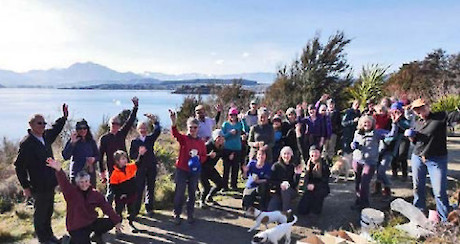 Te Kākano Trust members on the shores of Lake Wanakaand winter, the Trust organises planting sessions every other weekend and volunteers help to restore various habitats from wetlands to dry areas, in town and rural areas. The volunteers not only dig holes and plant beautiful native trees and shrubs, they also build wire netting cages to protect the most palatable species that rabbits would otherwise destroy. To give the plants the best chance of surviving, Te Kākano runs maintenance mornings through the summer to clear grass, cart water to the most needy plants, fix netting, add mulch, etc. Over the past 10 years, about 25,000 native trees and shrubs have been put in the ground. The support Te Kākano receives from the local community (volunteers, local businesses, other charitable organisations) is huge and, without it, they acknowledge they could not achieve all they have done, and all they aim to do with on-going and new restoration sites. “Kākano” means “seed” and the concept of “He Kakano” conveys growth, development, and expansion. Te Kākano has floated the seed further down the Clutha valley over the last two to three years, facilitating the establishment of the Mokihi Trust in Cromwell, which is focused on restoration projects, and the Haehaeata Natural Heritage Trust in Clyde, which has a community nursery to provide plants for its restoration projects. We would like the seed to keep floating down stream.
Te Kākano Trust members on the shores of Lake Wanakaand winter, the Trust organises planting sessions every other weekend and volunteers help to restore various habitats from wetlands to dry areas, in town and rural areas. The volunteers not only dig holes and plant beautiful native trees and shrubs, they also build wire netting cages to protect the most palatable species that rabbits would otherwise destroy. To give the plants the best chance of surviving, Te Kākano runs maintenance mornings through the summer to clear grass, cart water to the most needy plants, fix netting, add mulch, etc. Over the past 10 years, about 25,000 native trees and shrubs have been put in the ground. The support Te Kākano receives from the local community (volunteers, local businesses, other charitable organisations) is huge and, without it, they acknowledge they could not achieve all they have done, and all they aim to do with on-going and new restoration sites. “Kākano” means “seed” and the concept of “He Kakano” conveys growth, development, and expansion. Te Kākano has floated the seed further down the Clutha valley over the last two to three years, facilitating the establishment of the Mokihi Trust in Cromwell, which is focused on restoration projects, and the Haehaeata Natural Heritage Trust in Clyde, which has a community nursery to provide plants for its restoration projects. We would like the seed to keep floating down stream.
Local Authority Award: Hamilton City Council recognising Gerard Kelly
Hamilton City Council is to be congratulated for its ongoing support of restoration efforts within the city and for having on its staff Gerard Kelly, a dedicated and knowledgeable Community Planting Coordinator. His efforts are legendary. If you’ve ever been involved in a community restoration group in Hamilton or have taken part in Hamilton’s legendary Arbour Day planting at Waiwhakareke, or been involved in gully restoration in some way, then you have probably come across Gerard. He oversees and supports groups across the city, plant tens of thousands of trees each year and, of course, oversees the allimportant tree releasing and weed control. He has brought thousands of people together to support the restoration of Hamilton’s biodiversity through the planting of native trees. His knowledge, experience and passion for this work is inspiring and he passes this on daily through the work that he does. He never fails to find a way to lend a hand— whether it’s enabling a school group to take part in a local planting day or giving advice on what to plant and where. Gerard is a font of all knowledge, guiding and supporting community groups, individuals, schools, businesses and sports groups to take part in restoration planting and weeding in Hamilton. He works tirelessly to build understanding about the need for plant conservation and biodiversity restoration. Hamilton, the amazing gully network, the forest remnants and the ‘crown-jewel’, Waiwhakareke Natural Heritage Park, are better places because of Gerard
Special Award to a Community Group: Arrowtown Choppers
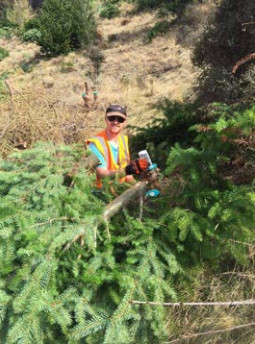 Keen ‘Chopper’ at workThe Arrowtown Choppers is a group formed under the umbrella of the Arrowtown Village Association. It was formed in 2016 and has been instrumental in turning the tide of thinking in the Arrowtown area against wilding conifers. It runs regular volunteer events including Thursday night ‘chops’ over summer months and an annual spring chop for the last two years. The group has concentrated their manual efforts on an accessible area in Sawpit Gully about 30 mins walk from Arrowtown where larch, Douglas fir and lodge pole pine are swamping out native grasslands, herb fields, and shrub lands and are encroaching into mountain beech forest remnants and preventing regeneration. In the Arrowtown area, removing wildings is the most effective action that can be taken to preserve native vegetation. Efforts have been concentrated in areas of high public use and where helicopter boom spraying would have an unacceptable impact on native vegetation growing amongst the conifers. The group has also attained funding to undertake extensive conifer control in the wider Arrowtown area and is moving into a phase of managing ground and air-based contractors. Community concerns with respect to retaining Arrowtown’s iconic autumn colours have been addressed by compiling a plan to replace wilding conifers and deciduous trees with natives and non-spreading exotic species. We suggest that acknowledging the Arrowtown Choppers by way of an award for undertaking weed control is apt recognition for a group whose work is arguably doing more for the protection of native vegetation than projects centred around the planting of planting native vegetation in modified environments. By controlling wilding conifers, the group is preventing the loss of extant vegetation communities, with the original genetic provenance and natural soil mycorrhiza associations, that are growing in their natural ecological niche.
Keen ‘Chopper’ at workThe Arrowtown Choppers is a group formed under the umbrella of the Arrowtown Village Association. It was formed in 2016 and has been instrumental in turning the tide of thinking in the Arrowtown area against wilding conifers. It runs regular volunteer events including Thursday night ‘chops’ over summer months and an annual spring chop for the last two years. The group has concentrated their manual efforts on an accessible area in Sawpit Gully about 30 mins walk from Arrowtown where larch, Douglas fir and lodge pole pine are swamping out native grasslands, herb fields, and shrub lands and are encroaching into mountain beech forest remnants and preventing regeneration. In the Arrowtown area, removing wildings is the most effective action that can be taken to preserve native vegetation. Efforts have been concentrated in areas of high public use and where helicopter boom spraying would have an unacceptable impact on native vegetation growing amongst the conifers. The group has also attained funding to undertake extensive conifer control in the wider Arrowtown area and is moving into a phase of managing ground and air-based contractors. Community concerns with respect to retaining Arrowtown’s iconic autumn colours have been addressed by compiling a plan to replace wilding conifers and deciduous trees with natives and non-spreading exotic species. We suggest that acknowledging the Arrowtown Choppers by way of an award for undertaking weed control is apt recognition for a group whose work is arguably doing more for the protection of native vegetation than projects centred around the planting of planting native vegetation in modified environments. By controlling wilding conifers, the group is preventing the loss of extant vegetation communities, with the original genetic provenance and natural soil mycorrhiza associations, that are growing in their natural ecological niche.
Special Award to a School: Motuora School, Taranaki
Moturoa School has officially been involved in community conservation and sustainability work for
the last 22 years. It is a “Trees for Survival” school and an Enviroschool (the first Enviroschool in
Taranaki). It has won the “Green” award and is about to qualify for a “Gold” award on 21 November
2018. With Trees for Survival, it is sponsored currently by Port Taranaki. The school educates its staff
every term at staff meetings and in turn the teachers work with their classes each term on a nominated
rare endangered species. The school gardens exist for educational purposes. The school employs an
Environmental Educator, Bill Clarkson, who works with groups of children every Tuesday. The school
has frequent plantings at a variety of locations throughout Taranaki. The school holds open days and
works with DOC, councils and community groups. The school also has public displays in the city over
conservation week and is also active in “Keep NZ Beautiful” week. They do heaps!
